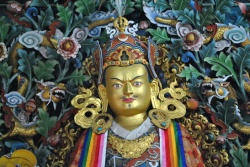Eternalism
Eternalism (rtag lta). The belief that there is a permanent and causeless creator of everything; in particular, that one's identity or consciousness has a concrete essence which is independent, everlasting and singular. eternalism: Extreme viewpoint rejected by the Buddha where one views things such as self or soul as being eternal. That is, one views things as being real in themselves rather than existing conditionally. Often contrasted to the other extreme of nihilism.
See; Parileyyaka Sutta.
Eternalism (Skt. nitya dṛṣṭi; Wyl. rtag pa'i lta ba or Skt. nityānta; Wyl. rtag pa'i mtha') — one of the so-called 'two extremes', eternalism is the belief that there is a permanent and causeless creator of everything; in particular, that one's identity or consciousness has a concrete essence which is independent, everlasting and singular.
There are many different brands of eternalism; they can be classified into three hundred sixty views, sixty-two false positions, eleven systems, and so on. All can, however, be condensed into the five tarka, or speculative systems.[1]
Alternative Translations
- Absolutism (Geshe Thupten Jinpa)
- Permanence (Dharmachakra Translation Committee)
Notes
- ↑ Mipham Rinpoche - Shantarakshita, The Adornment of the Middle Way: Shantarakshita's Madhyamakalankara with Commentary by Jamgon Mipham, Translated by Padmkara Translation Group (Boston: Shambhala, 2005), p. 217.
